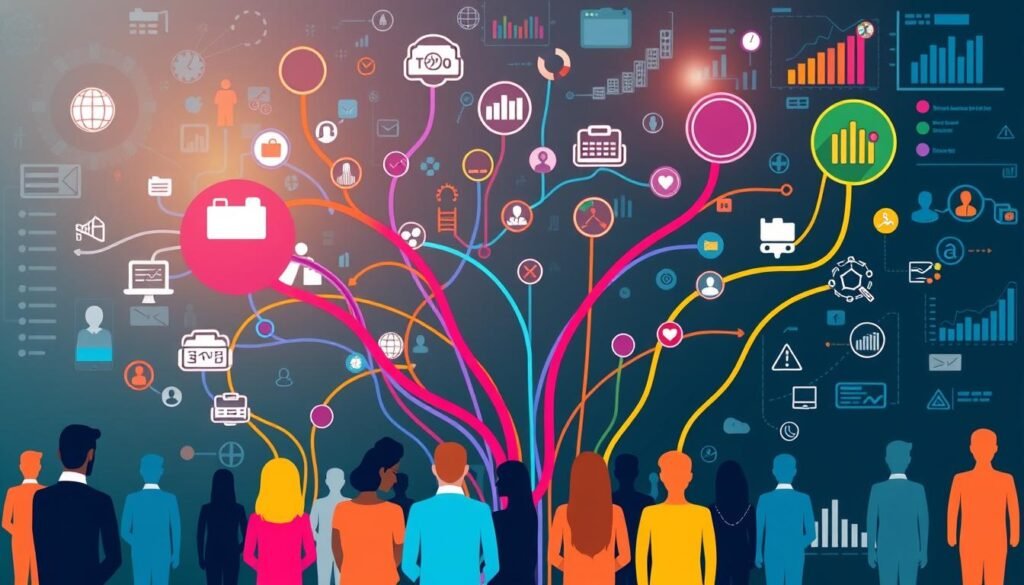In today’s digital world, artificial intelligence (AI) has changed how companies market to us. AI lets businesses look at lots of data, guess what we might buy, and send us ads that really talk to us. This new way of marketing makes things better and bigger, changing how companies reach out to us.
AI has made a big difference in how companies connect with us. It has moved from old ways to new AI methods. Now, marketers can make quick decisions, using smart algorithms to know what we like and need. This helps build loyalty and makes us more aware of brands.
Key Takeaways
- AI marketing strategies enable precise audience targeting and personalization, leading to higher engagement and conversion rates.
- AI-powered platforms analyze consumer data to deliver content tailored to individual preferences, fostering deeper brand loyalty.
- Automated marketing processes driven by AI improve operational efficiency and streamline customer communication.
- AI technologies provide critical insights for strategic decision-making, helping businesses adapt to evolving market trends.
- AI-enabled brand reputation management monitors customer sentiment and facilitates proactive customer service.
Understanding the Evolution of AI-Driven Marketing Personalization
The move from old to new personalization ways is a big change in marketing. Before digital, personalization was based on broad groups and direct feedback. It didn’t hit the mark for good targeting.
The digital era brought lots of customer data. But, early algorithms found it hard to really personalize well.
Traditional vs Modern Personalization Methods
Old personalization methods used manual work and broad customer profiles. Now, predictive analytics and machine learning algorithms help marketers focus on what each customer does. This change has made targeted content delivery better and more precise.
The Shift from Manual to Automated Marketing
With more data, old ways of personalizing were not working well. AI and machine learning have made these tasks automatic. This lets marketers handle huge amounts of data quickly.
Now, companies can guess what customers will want next. They can then tweak their marketing plans to meet those needs.
Key Technological Advances in Marketing AI
- Real-time data processing and analysis
- Advanced pattern recognition capabilities
- Predictive modeling to anticipate customer needs
- Dynamic content creation and delivery
- Personalized recommendations and search results
These tech steps have helped marketers give better, more personal experiences. This has made customers happier, more engaged, and more likely to buy.
The Role of AI in Personalized Marketing: How Companies Target You Better
Artificial Intelligence (AI) is changing how companies market to you. It helps them understand what you want better. AI uses smart algorithms to look at lots of data and guess what you might like.
AI is making marketing more personal through customer segmentation. It uses behavioral targeting to group people based on what they do and buy. This way, companies can make ads that really speak to you, making you more likely to engage and stay loyal.

AI also helps with real-time optimization. It lets marketers adjust their plans as they go, based on how people react. This means you always get an ad that fits what you’re into right now.
“AI is transforming the marketing landscape, empowering businesses to connect with customers on a deeper, more personal level than ever before.”
As AI gets more common in marketing, things are going to get even more personal. Companies will be able to connect with you in ways that feel more real. This could lead to happier customers and more success for businesses.
How AI Analyzes Customer Behavior and Preferences
Artificial Intelligence (AI) has changed how businesses understand their customers. It uses advanced consumer data analysis to get deep into what customers like and do. This helps create marketing that really hits the mark.
Data Collection and Processing Methods
AI tools collect lots of customer data from different places. This includes what they buy, what they browse online, and their social media activity. Then, AI uses smart algorithms to make sense of it all and find out what customers really want.
Pattern Recognition and Behavioral Analysis
AI uses predictive analytics to spot trends in how customers act. It looks at what they’re interested in, when they buy things, and how they like to be reached. This detailed behavioral targeting lets businesses make profiles of their customers. They can then guess what customers might want next, making their marketing more personal and effective.
Predictive Analytics in Customer Profiling
AI can mix data from many places, like what customers buy and their social media habits. This helps create detailed profiles of customers. These profiles guess what customers might like, how likely they are to buy, and how much they might spend over time. This lets businesses tailor their marketing to fit each customer perfectly.
“Amazon reported that as much as 35% of its revenue comes from cross-selling and upselling facilitated by AI-driven personalized marketing strategies.”
By using consumer data analysis, predictive analytics, and behavioral targeting, AI makes marketing more personal. This is a big plus for businesses in today’s online shopping world.
Real-Time Personalization and Dynamic Content Delivery
AI-driven marketing technologies have changed how companies reach and connect with customers. Real-time personalization and dynamic content delivery are key. Brands use advanced machine learning to make websites and ads that change based on what each user likes and does.
Companies like Netflix and Amazon lead the way with personalized content suggestions. AI chatbots also offer tailored product picks, deals, and help based on what you’ve looked at and bought before.
This approach makes ads and content more relevant and interesting for each person. Research shows personalized content grabs attention 80% better than generic stuff. Businesses using AI for real-time optimization see a 30% boost in efficiency and a 20% jump in sales.
“We grew to 100k/mo visitors in 10 months with AIContentfy,” boasts the founder of the AI-driven content creation platform.
AI lets marketers give customers a unique experience, leading to more engagement, loyalty, and sales. As AI gets better, we’ll see even more advanced marketing tools in the future.
| Metric | Impact of AI-Powered Personalization |
|---|---|
| Revenue Growth | Companies using predictive analytics are 2.9 times more likely to see their revenue grow faster than the industry average. |
| Cost Reduction | McKinsey reports that companies utilizing AI for personalization can reduce costs by up to 20%. |
| Customer Engagement | Personalized content is 80% more effective in capturing user attention compared to non-personalized content. |
| Customer Loyalty | 91% of consumers are more likely to shop with brands that provide relevant offers and recommendations. |
Machine Learning Algorithms in Customer Segmentation
Marketing has become more data-driven, thanks to machine learning algorithms. These tools help businesses find patterns in customer data. This way, companies can make marketing that really speaks to their audience.
Advanced Targeting Techniques
Machine learning looks at lots of customer data, like who they are and what they like. It uses K-means clustering, DBSCAN, and Agglomerative Clustering to group customers. This makes marketing more focused and effective.
Customer Journey Mapping
AI helps map out the customer journey. It tracks where customers go and what they do. This lets marketers know exactly when to reach out with personalized content. It’s a big step towards better customer experiences.
Behavioral Scoring Models
Machine learning also scores how customers behave. It looks at things like website visits and purchases. This helps predict what customers might do next. It’s a smart way to tailor marketing and keep customers coming back.
Machine learning has changed the game for personalized marketing. It helps businesses understand and meet customer needs. As the tech gets better, so will the ways we use it to connect with customers.

| Key Metrics | Findings |
|---|---|
| Customer Segmentation Effectiveness | Companies implementing segmentation are 60% more likely to understand customer challenges and 130% more likely to be aware of their intentions. |
| Email Marketing Performance | Segmented email campaigns are more likely to have high open rates, CTR, and conversions. |
| Net Promoter Score (NPS) | NPS is calculated by subtracting the percentage of detractors from promoters. For example, if you have an NPS of +40, you have 40% more promoters than detractors. |
| Customer Churn Impact | Even a slight decrease in customer churn can significantly impact your business’s bottom line. |
AI-Powered Marketing Automation Tools and Platforms
In today’s marketing world, AI tools and platforms are changing how businesses talk to customers. They use artificial intelligence (AI) to make marketing tasks easier and better. This includes email campaigns, social media, and making content just for each customer.
For example, HubSpot uses AI to help with lead scoring, suggesting content, and improving campaigns. Marketo also uses AI to understand what customers like and want. This helps marketers send out campaigns that really hit the mark.
AI isn’t just in these big platforms. AI chatbots are everywhere, offering help and advice 24/7. They use natural language processing (NLP) and sentiment analysis to talk like humans. This makes customer service feel more personal and friendly.
Using AI in marketing has many benefits. It automates boring tasks and makes campaigns better with real-time data. This means marketers can do more with less effort. Plus, it helps create experiences that customers love, leading to more loyalty and success for businesses.
As more businesses use AI for marketing, the future looks very promising. Those who jump on this technology will stay ahead of the game. They’ll build stronger, more meaningful connections with their customers.
| AI Marketing Strategies | Adoption Rate | Key Benefits |
|---|---|---|
| Email Marketing Automation | 85% of marketers | Improved open rates, click-through rates, and conversion rates |
| AI-Powered Chatbots | 70% of businesses | 24/7 customer service, reduced response times |
| Personalized Content Delivery | 46% of customers | Increased customer engagement and loyalty |

As AI marketing grows, the future of personalized ads is looking up. Businesses that use these new technologies will stay ahead. They’ll build stronger, more meaningful connections with their customers.
Privacy Concerns and Data Protection in AI Marketing
AI marketing uses a lot of personal data. It’s important to handle this data carefully and follow rules like GDPR. This means being open about how data is used and getting clear consent from users. It’s also about finding a balance between making things personal and keeping privacy safe.
Building trust with customers is key. Companies need to have strong data privacy plans. This includes telling users how their data is used, keeping it safe, and checking if they follow the rules. It’s also important to invest in security and train staff on privacy.
GDPR Compliance and Data Security
GDPR says companies must tell users how they use their data and get their consent. They also need to keep data safe from hackers. This means using things like encryption and checking their data protection plans often.
Ethical Considerations in Data Collection
AI marketing can raise questions about privacy and fairness. Companies should make sure they collect and use data in a way that’s fair and respects privacy. Being open about how data is used and following ethical rules helps build trust.
Building Customer Trust
With more data breaches and people caring more about privacy, keeping data safe is crucial. Companies need to have good data privacy plans, check their security often, and teach their team about data care.
| Key Privacy Measures | Description |
|---|---|
| Transparent Data Policies | Clear and accessible information about data collection, usage, and sharing practices |
| Robust Consent Management | Obtaining explicit user consent for data collection and marketing personalization |
| Secure Data Storage | Implementing encryption, access controls, and regular security audits |
| Ethical Data Practices | Ensuring fair, inclusive, and privacy-preserving data collection and analysis |
“Protecting customer privacy is not just a legal requirement, but a moral obligation for any company that seeks to build long-term trust and loyalty.”
Measuring Success: AI Marketing Metrics and KPIs
Businesses are using AI more in their marketing plans. It’s key to measure how well these plans work. Marketing metrics and KPIs help marketers see the impact of AI campaigns and make better choices.
Mean squared error is a direct metric for AI marketing. It shows how close the AI output is to what was expected. Perplexity is important for language AI, showing how well the AI guesses a sample.
For AI that makes media or images, Fréchet inception distance (FID) and structural similarity index measure are key. They check if the AI-made content looks like the real thing.
- Mean time to repair: Shows how fast AI issues are fixed
- First contact resolution rate: Tells how often problems are solved right away
- Content relevance score: Checks if AI text meets business or creative needs
Metrics like customer satisfaction, user engagement rates, and innovation score are also important. They help see how well AI marketing works. By watching these metrics and adjusting, marketers can improve customer interaction and the ROI of AI.
It’s important for AI marketing to be both accurate and precise. Metrics like click-through and conversion rates show how users interact with AI content. Personalization metrics like customer satisfaction and repeat business are key to seeing if AI marketing works well.
The success of AI in marketing depends on a good plan, skilled people, and knowing the right metrics and KPIs. By using these insights, businesses can make their AI marketing better and grow in the long run.
Future Trends in AI-Driven Personalized Marketing
The marketing world is about to change a lot, thanks to AI marketing strategies. Soon, several key trends will change how we do personalized advertising techniques and future trends in marketing.
Natural language processing (NLP) is getting better fast. AI chatbots and voice assistants will soon talk like humans. This means brands can offer content and deals that really fit what customers want.
Predictive analytics is also growing fast. AI will use lots of customer data to guess what people will buy and do next. This helps marketers make better choices and send ads that really speak to their audience.
AI and the Internet of Things (IoT) will also change marketing a lot. With more smart devices, brands can learn what customers like in real time. This lets them give customers experiences that are just right for them, everywhere they go.
As AI marketing gets more common, we’ll see more focus on using AI the right way. People want to know their data is safe and in good hands. Companies must keep this in mind to keep their customers happy and loyal.
In the future, AI-driven personalized marketing will keep getting better. This will bring both great chances and big challenges for marketers. By keeping up with these changes and adjusting their plans, brands can really connect with their customers and grow in a healthy way.
| AI Marketing Trend | Anticipated Impact |
|---|---|
| Natural Language Processing (NLP) | More human-like interactions, deeper personalization, and seamless customer experiences |
| Predictive Analytics | Improved forecasting of customer behavior, enabling highly targeted personalized campaigns |
| AI-IoT Integration | Real-time data gathering and delivery of hyper-personalized experiences across multiple touchpoints |
| Ethical AI and Data Privacy | Increased focus on responsible AI implementation and transparent data management to build customer trust |
“As AI technology evolves, marketers will need to continually adapt their strategies to leverage new capabilities and meet changing consumer expectations.”
Conclusion
The world of AI marketing is growing fast, with big chances for personalized ads. AI can now understand customer data better and send out targeted content. But, the human touch is still key in making marketing work well.
Marketers need to find a balance. They should use AI’s power but also keep a personal connection with their audience.
AI has already made a big difference in how well ads work. It helps brands give customers experiences that feel just for them. But, there are still big challenges ahead.
Marketers must deal with issues like keeping customer data safe, making sure AI is fair, and fitting AI tools into their current plans.
The future of marketing looks bright, with AI getting even better at understanding us. It will use things like natural language, computer vision, and deep learning to make ads even more personal.
As AI gets smarter, the job of marketers will change. They’ll need to know a lot about these new tools and make sure they’re used right. This way, they can make ads that really speak to people and keep building trust.






